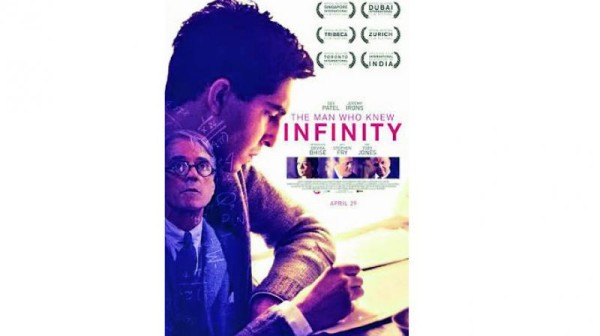The story of Ramanujam, back in India would have made it a more interesting movie
S. Ramanujam’s work in mathematics is truly enriching and profound and a biopic on his short life does help in making people look up his life’s work and remember this intuitive genius. The Man Who Knew Infinity is a wonderful film with a brilliant screenplay that moves fast, and challenges the audience to stay alert. It is also a big home run for all of us Indians who would be delighted to see him presented in such likeness.
The movie begins with a rapid pace, lands you straight into the adulthood of S. Ramanujam and proceeds to take him quickly to London’s Trinity College. His life in London is the more important episode here, and that has been constructed well. Dev Patel (S. Ramanujam) plays the character with exceptional presence, helped to a large extent by co-actor Jeremy Irons (Prof. Hardy); they create an excellent contrast on screen. Unlike the Imitation Game this movie stays grounded and, mostly, very humble.
Cinematically, it’s a treat to watch the settings of pre-Independent India in full HD, a very careful imagery allows near perfect storytelling and very little revelation of things outside the frame. It is a nuanced film that is set in the period when World War I begins, but one does not see the war in the form that is usually visible, rather one sees the effect a war has on routine activities. Rationing of supplies, curtailing of space and having to contribute to affairs that you have no interest in. Prof. Littlewood’s (Toby Jones) assignment to help the war with ballistic calculations is one such example where he is forced to leave the college and go out to the battlefield, it is in such minor observations that the movie stands out.
In larger frames, however, some monotony steps in; one does not really observe any distinct features of pre-world war clothing or equipment, the performances too become a little fragile in such frames. The closing moments of the movie, when Prof. Hardy makes a brilliant speech, reflecting upon his association with Ramanujam, and appeals for electing him as a fellow to the Royal Society, seems a bit like a takeaway from a sports movie, or any other adrenaline high situation where a commander wants to raise the spirits of the boys.
Personally, I would have loved to see how actual mathematicians would have had that conversation, minus the gradually rising sound track, least they are all mathematicians, pure scientists and would have had seen the logic bereft of the music too.
There is some relief in the realisation that the movie does not load you with too many equations, there are fleeting moments when you actually see the equations, something that you aren’t expected to make sense of anyway. This is a little different from how A Beautiful Mind treats its viewers, in which you see a constant barrage of equations scribbled all over the screen.
The story of Ramanujam, back in India would have made it a more interesting movie. Once Ramanujam departs from London, we only see a few moments of him and his family, and finally a letter informs London of his demise. It’s a careful selection of moments from his life that are compiled and presented, and anything that seemed unnecessary has been omitted completely.
Biopics are difficult to make as there is always a danger of showing too much of something or leaving out a lot of details. Every director suffers during the process and has to make some really difficult choices. Sometimes the details are altered to suit the sensibilities of a modern audience, for instance, Ramanujam married a 10-year-old Janaki in 1909 and departed for London in 1914. Devika Bhise, although a brilliant actor inspiring some romance, did not seem like a 10-year-old, and therefore becomes an inaccuracy in the whole story. If I see it again, my focus would be on Devika Bhise to understand her character better.
The Man Who Knew Infinity has played the tropes well and comes very close to how the life and times would have actually been, more importantly, it sparked an interest in the person and his work; work that shaped our understanding of the modern world in numerous ways.



Leave a reply